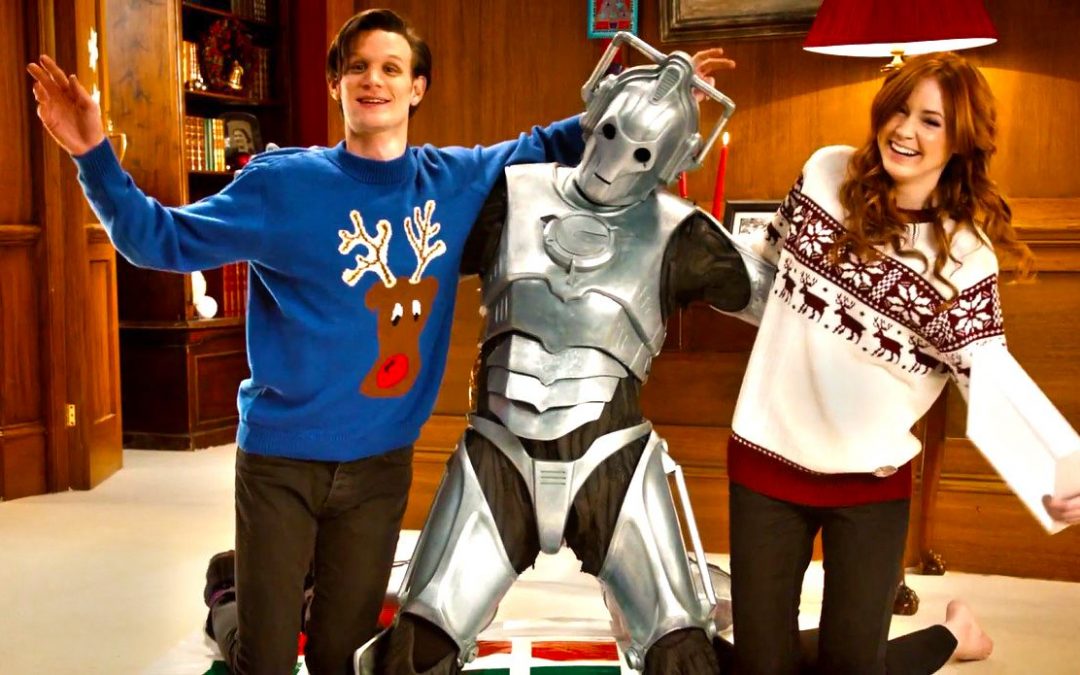Read Mark’s retrospective on Russell T. Davies’ Christmas Doctor Who specials here.
Steven Moffat’s first Christmassy contribution to Doctor Who comes near the end of his second episode, The Doctor Dances, when Rose Tyler compares a jolly Doctor to Santa Claus. “Who says I’m not, red bicycle when you were 12?” comes the cheeky reply.
Comparisons between the Doctor and Father Christmas go all the way back to Moffat’s Comic Relief sketch The Curse Of Fatal Death and continue all the way throughout his tenure as head writer and executive producer, particularly in his seasonal specials. Having inherited the tradition, he upheld it very well.
Like Russell T. Davies before him, Moffat didn’t treat the Christmas special as a trifle or a passing fancy, but as a proper episode of Doctor Who. With his take on the show, that means complex and compelling (and sometimes even smart-alecky) plots that were occasionally criticised for being a bit involved for viewers after Christmas dinner and a drink or two.
But if you’ve ever enjoyed Moffat’s fast-paced take, these episodes will reward a rewatch, especially with no new edition forthcoming this December 25th. It’s worth noting at this juncture that he agreed to write last year’s Christmas special, expressly so the show could keep its coveted Christmas Day timeslot. With that in mind, it’s a real shame that Chris Chibnall has moved the special to New Year’s Day.
That said, there have been a lot of Doctor Who festive specials already. Seeing as how Moffat wrote the majority of them, the second part of our Christmassy feature is an eight-course retrospective of the writer’s Yuletide offerings, which starred Matt Smith and Peter Capaldi as the Doctor. Without any further ado, let’s tuck in and reminisce over the good, the less good, and all that fan service…
A Christmas Carol (2010)

As with our feature on the Christmassy episodes of the RTD era, we begin with Charles Dickens. Taking a few timey-wimey liberties with the greatest Christmas story ever told, Smith’s Doctor creates ghosts in the past, present, and future for the Scrooge-like miser Kazran Sardick, who stands in the way of salvation for the newlywed Amy and Rory’s honeymoon cruise.
Played at various points in his life by Michael Gambon, Laurence Belcher, and Danny Horn, Kazran is the reason why the episode works. In almost every iteration, A Christmas Carol is a story that’s more about redemption than it is about time travel. More than any of the obligatory genre antics with the crashing spaceship and the time-travelling shenanigans, it’s the reluctant companion’s soul that is at stake.
Despite its typically complex structure, it’s really a straightforward, crowd-pleasing sort of episode. To see it perfectly summed up, look at the beautifully observed moment when Smith attempts a bit of technobabble about why the sky sharks are so soothed by Katherine Jenkins’ Abigail singing to them and gets told to shut up by everybody around him, from young Kazran to the microscopic organisms in the air. Representing Doctor Who at its most delightful, this is often indistinguishable from magic.
Better watch out: As well as the obvious literary source, Moffat loosely adapts his own Doctor Who short story, Continuity Errors. The story follows the Seventh Doctor as he goes back in time and subtly changes a librarian’s entire life in order to change her mind about lending him a book that will save the universe. The TV version has got more flying sharks in it.
The Doctor, The Widow And The Wardrobe (2011)
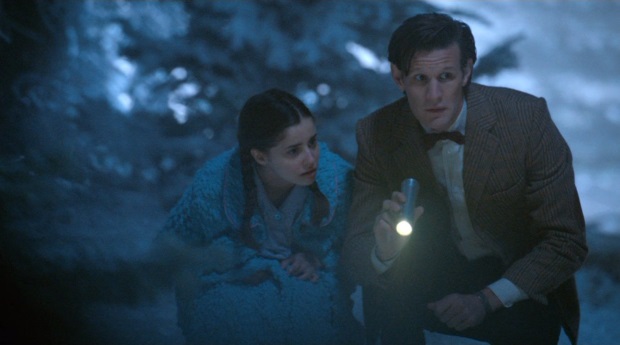
By some quirk of its staggered scheduling, series seven technically has three Christmas specials rather than the usual one. For many viewers, The Doctor, The Widow And The Wardrobe is the weakest of the three. It has the bones of a story about children being evacuated to the countryside during World War II and crossing the threshold of an otherworldly realm, but unlike the previous year’s offering, the C.S. Lewis-inspired title has as much to do with the pun-spiration behind it as Arachnids In The UK had to do with the Sex Pistols.
Starting with Smith doing his Moonraker thing off an exploding spaceship and the airborne disappearance of Reg Arwell echoing the classic opening of A Matter Of Life And Death, it’s more of a patchwork of ostensibly Christmassy bits. The portrayal of Claire Skinner’s Madge Arwell provides a timely celebration of mums, given the previous series’ appalling treatment of Amy’s pregnancy, but the story itself doesn’t feel especially… well, special.
The scatter-brained main story means that the highlight of the episode is the final scene outside the Ponds’ house, which serves as an epilogue to both the episode and series sux. In an episode that’s decidedly companion-lite, it’s properly heart-warming to see that particular TARDIS team reunited for Christmas dinner, even if it all ends a bit tragically, five or six episodes later.
Better watch out: The main thrust of the episode is an environmental story, with the magical alien forest under threat by the actions of industrial bastards from Androzani Major. The planet was previously mentioned in the Fifth Doctor’s final story, The Caves Of Androzani, a story in which almost every character died. This episode has a happier ending.
The Snowmen (2012)
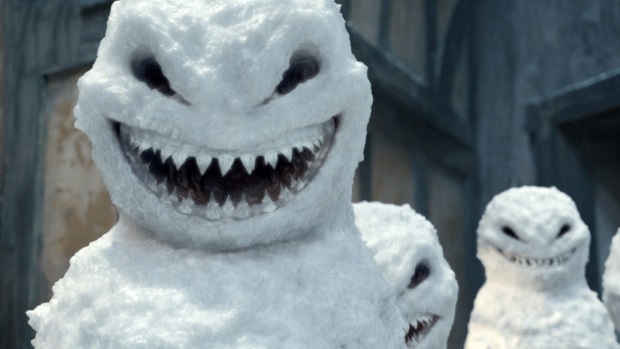
Alternative title: Mister Doctor, You Can Still Save Her. We Gave You All The Clues.
Short of a very brief Christmassy interlude in Chibnall’s The Power Of Three, which saw the Doctor living with his companions for a whole year, the next festively-themed episode followed a mid-series finale. But Amy and Rory are gone for good this time, and the Doctor has spent 200 years with his head in the clouds when Victorian barmaid Clara arrives to shake him out of his reverie.
The Snowmen is close to approximating the title of another festive classic, but the only real allusion to the animated classic is when the ice governess attempts walking in the air with Clara in tow. Instead, it’s the first story in the Hammer-style Victorian horror locale that would recur in The Crimson Horror and Deep Breath, with Madame Vastra the Silurian, her wife Jenny, and their butler Strax the Sontaran helping the Doctor to fend off another returning alien.
In her second, most Cockney incarnation, Jenna Coleman is allowed to shine without being shrouded in the mystery about her character. With her death and the reintroduction of the Great Intelligence, (now played by the twice-not-really-a-Doctor Doctor, Richard E. Grant) the episode is a stealth setup for the second half of series seven, which doubled as the 50th-anniversary run.
Better watch out: There was some excellent supplementary content for this one on the official Doctor Who website, including Strax’s rendition of certain popular Christmas carols. Our favourite is “Rudolph the red-nosed reindeer had a very shiny nose, giving him a distinct tactical disadvantage, as it allowed me to punch him in the dark!”
The Time Of The Doctor (2013)
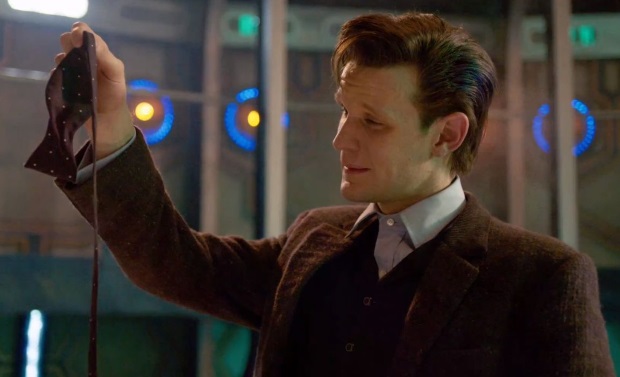
Closing the ‘Of The Doctor’ trilogy, this is an episode which feels somewhat overburdened with fan service. In all the legends of Trenzalore, we never heard that it was all going to end in a town called Christmas. With returning monsters galore and a lot of exposition about truth fields and pocket universes, this is a far, far more convoluted successor to Davies’ precedent-setting seasonal regeneration story, The End Of Time.
Moffat has since admitted that he considered leaving with Smith, but after his unenjoyable experience of wrangling the 50th anniversary season, he was persuaded to stick around for another series and end on a high. Unfortunately, Smith didn’t want to do a fourth series and so the planned culmination of the Eleventh Doctor’s long-running arc fell upon a single episode.
It doesn’t work because it’s hard to feel the stakes. It’s halfway over before we even find out that the Doctor has run out of regenerations and with a limited amount of screen time left, the weight of that is conveyed through old age make-up rather than character development. Despite the title, time is the one thing this episode doesn’t have enough of, and of all the Christmas specials, this is the one that’s most difficult to sit through with the relatives you’ve persuaded to let you have the telly.
Better watch out: In the moving final reunion of the Eleventh Doctor and Amy Pond, both Smith and Gillan are wearing wigs. At the time of production, both had shaved their heads for roles in Ryan Gosling’s Lost River and Marvel’s Guardians Of The Galaxy, respectively. Goodnight, wiggedy man!
Last Christmas (2014)
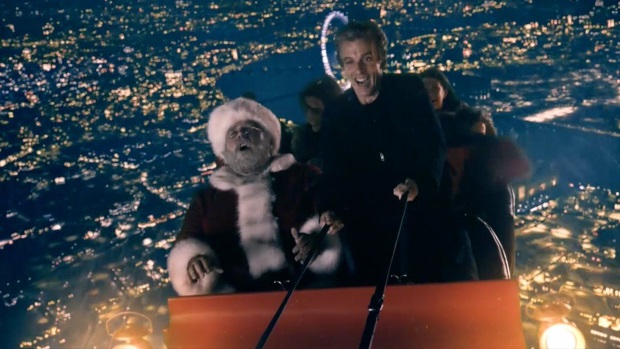
Bringing back a tradition from the Davies era, the Series 8 finale, Death In Heaven, featured a mid-credits scene introducing Nick Frost as Father Christmas. One of the spookier Christmas outings, Last Christmas is also staged as an epilogue to the most recent series, as the Doctor and Clara are mysteriously thrown together again in a battle with the crab-like Kantrofarri in a research station at the North Pole.
It’s surprising that we haven’t had more out-and-out Christmas horror stories from Doctor Who’s seasonal episodes thus far, but Last Christmas is the closest thing (John Carpenter’s The Thing, specifically) we’ve had. Leavening the mood, Frost lives up to his spectacularly Christmassy name as a gregarious Santa, whose existence is left nicely ambiguous by the time the credits roll.
At the time it was originally written, this was supposed to be Coleman’s final episode, but she changed her mind about quitting after the first script readthrough. The Peter Pan-inspired feint where the Doctor returns too late and finds her elderly and infirm would have been a really moving exit for Clara, but it turned out to be only her antepenultimate exit overall. On its own merits, it leaves us on a welcome warm note in an effective and entertainingly chilling adventure.
Better watch out: It’s since been confirmed that Middlesbrough-born Faye Marsay’s character Shona McCullough was being lined up to take over from Coleman as the new companion before the ending was changed. As a son of the Boro, I’m allowed to say that time and space probably wasn’t ready for a Teessider anyway.
The Husbands Of River Song (2015)
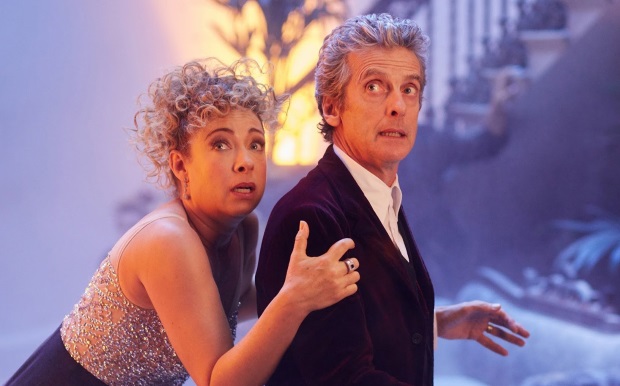
The Husbands Of River Song is the best River Song episode. Maybe it’s not the best episode with River in it, but as a send-off for Alex Kingston’s spoilerific spouse, it’s unimprovable. It makes the best of revelations in The Time Of The Doctor by having River be absolutely certain that even if it crossed her mind, there are no more Doctors that she doesn’t know about. For one night only, the Doctor is ahead of her.
Given a romantic comedy story to act in, Capaldi’s doing stuff that we never see him do elsewhere in his run. The actor rightly ruled out any romances with his young companions, but there’s a willingness to laugh again in Twelve’s reunion with River that’s absolutely joyous. Plus, from the chuckles of Capaldi getting to do his “bigger on the inside” reaction (the same beat wouldn’t really have fit in The Fires Of Pompeii now, would it?) to the hilarity of casting Greg Davies as a right royal bonehead, it’s a really funny one.
All the way through, River is her usual flirty and dangerous self, but in a welcome role reversal, Kingston is magnificent. The joke of her not recognising the Doctor is almost stretched too far at the point when the pay-off lands. From the moment in which she admits that she never believed the Doctor loved her back, to the final reveal of the Singing Towers of Darillium, Kingston is magnificent. In addition to the “new hair and new suit” that River describes to the Tenth Doctor in Silence In The Library, we realise that everything about this is new to her, and it’s new to us too.
The result is a gorgeous sci-fi farce, with a seasonally appropriate panto villain. Come to think of it, the Shoal of the Winter Harmony have odd heads too, and the gruesome physiology of it all leads to some really creative twists. Overall, it’s one of Moffat’s funniest scripts, but the heart of it absolutely shines through. Like the plot McGuffin embedded in King Hydroflax’s enormous head, this special is a real gem.
Better watch out: “And they both lived happily ever after.” This was originally intended to be the showrunner’s final script for the series. After it became clear that Broadchurch would make incoming showrunner Chris Chibnall unavailable until this year, Moffat agreed to write another series in the interim, starting with the following year’s Christmas special. This would have been a lovely note to go out on, but it does leave you wanting more…
The Return Of Doctor Mysterio (2016)
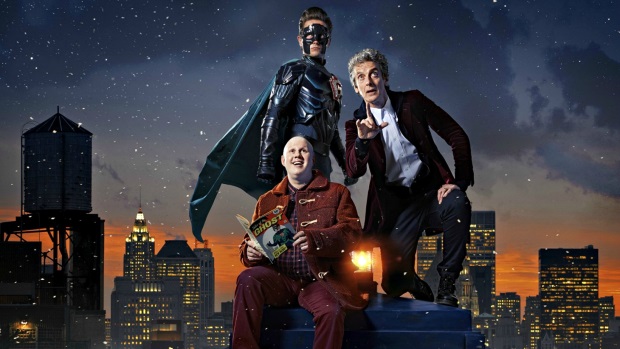
At last, a Christmassy Ghost story! With no series in between, The Return Of Doctor Mysterio is the second Christmas special in a row. Strangely, when binging the Capaldi era, it makes this one feels like the second part of a two-parter. Aside from bringing back Matt Lucas’ Nardole and the Shoal of the Winter Harmony from the last episode, it makes the time between episodes into part of the narrative. It’s a year later for us and 24 years on Darillium for the Doctor.
In the main plot, it feels like a departure for Doctor Who to do an episode about another superhero, because the Doctor himself is portrayed more and more like a superhero in the new series. As you’d expect, the episode takes an off-kilter approach to Grant, a devoted child-minder who also happens to use his Superman-powerset to moonlight as a masked hero called the Ghost.
Evidently, the part of Richard Donner’s Superman best remembered is the playful banter, which is the most memorable aspect of this one. First and foremost, it’s a comic book quip-fest that finds the marvel in its characters, rather than in the Marvel of it all. On top of that, the decision to reconfigure Nardole as a companion in the style of K9 – a big, daft valet for the Doctor to shout at while secretly enjoying his company – is a masterstroke that continued to pay off through series 10.
Better watch out: In terms of comic book influences, the Harmony Shoal lads have obviously been watching the Watchmen, partly lifting Ozymandias’ scheme of destroying New York in order to unite the world. It’s unclear if the final tease about them infiltrating UNIT was an unfulfilled plan for series 10 or just an open ending, but thus far, we’ve heard no more from the Kinder egg-heads.
Twice Upon A Time (2017)
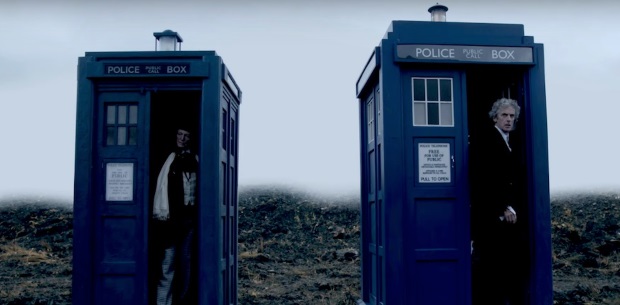
Technically, all regeneration episodes are multi-Doctor stories. But with David Bradley playing the First Doctor, Moffat gets to finish on an idea that encompasses the hopes and fears of all the years, with the original incarnation and the current one having a heart-to-heart as they face their respective final curtains. Swept up in the slipstream of a decidedly not-evil plan, the Doctors come together to reflect on expanse between them.
In vast contrast to Smith’s finale, Twice Upon A Time has more time for such reflection. The Doctor is already dead by the end of The Doctor Falls, which means this is a regeneration episode in the most literal sense. It’s about the regeneration itself, and it’s different from any other episode of its kind. For instance, the Tenth Doctor doesn’t want to go, but Twelve doesn’t want to stay, and even in accepting his future, there’s a lovely counterpoint to that reluctance in his final words.
Rusty the Dalek, the Brigadier’s father, and the spectre of Bill Potts reach out from the show’s past to make this less than standalone, to say nothing of the First Doctor’s over-egged chauvinism. Somehow, it still doesn’t detract from a low-stakes swansong that gives us time to realise how much we’ll miss this Doctor, leaving it for the next incarnation to immediately land herself in mortal danger.
Given his tendency towards circular time travel stories and setpieces, it’s fitting that Moffat ends his run of Christmas specials in the fashion that it began – with a heartfelt consideration of the past, the present, and what’s yet to come…
Better watch out: Whether you loved this episode or not, Paul Cornell’s excellent Target novelisation from earlier this year is required reading. In the time-honoured style of Target books, Cornell adds more detail than the episode has time for, including a passage that explains how exactly the TARDIS finally persuades the Doctor that “one more lifetime won’t kill anyone”. Such details are too lovely to spoil here, but it’s an essential companion to the most unique of the new series’ regeneration stories.

